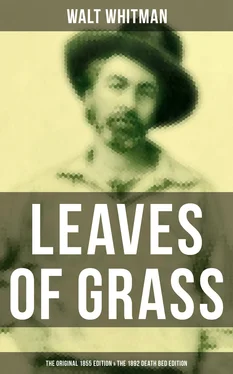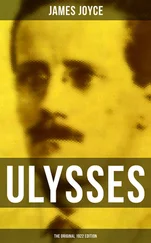Glassblowing, grinding of wheat and corn . . casting, and what is cast . . tinroofing, shingledressing,
Shipcarpentering, flagging of sidewalks by flaggers . . dockbuilding, fishcuring, ferrying;
The pump, the piledriver, the great derrick . . the coalkiln and brickkiln,
Ironworks or whiteleadworks . . the sugarhouse . . steam-saws, and the great mills and factories;
The cottonbale . . the stevedore’s hook . . the saw and buck of the sawyer . . the screen of the coalscreener . . the mould of the moulder . . the workingknife of the butcher;
The cylinder press . . the handpress . . the frisket and tympan . . the compositor’s stick and rule,
The implements for daguerreotyping . . . . the tools of the rigger or grappler or sailmaker or blockmaker,
Goods of guttapercha or papiermache . . . . colors and brushes . . . . glaziers’ implements,
The veneer and gluepot . . the confectioner’s ornaments . . the decanter and glasses . . the shears and flatiron;
The awl and kneestrap . . the pint measure and quart measure . . the counter and stool . . the writingpen of quill or metal;
Billiards and tenpins . . . . the ladders and hanging ropes of the gymnasium, and the manly exercises;
The designs for wallpapers or oilcloths or carpets . . . . the fancies for goods for women . . . . the bookbinder’s stamps;
Leatherdressing, coachmaking, boilermaking, ropetwisting, distilling, signpainting, limeburning, coopering, cottonpicking,
The walkingbeam of the steam-engine . . the throttle and governors, and the up and down rods,
Stavemachines and plainingmachines . . . . the cart of the carman . . the omnibus . . the ponderous dray;
The snowplough and two engines pushing it . . . . the ride in the express train of only one car . . . . the swift go through a howling storm:
The bearhunt or coonhunt . . . . the bonfire of shavings in the open lot in the city . . the crowd of children watching;
The blows of the fighting-man . . the upper cut and one-two-three;
The shopwindows . . . . the coffins in the sexton’s wareroom . . . . the fruit on the fruitstand . . . . the beef on the butcher’s stall,
The bread and cakes in the bakery . . . . the white and red pork in the pork-store;
The milliner’s ribbons . . the dressmaker’s patterns . . . . the tea-table . . the homemade sweetmeats:
The column of wants in the one-cent paper . . the news by telegraph . . . . the amusements and operas and shows:
The cotton and woolen and linen you wear . . . . the money you make and spend;
Your room and bedroom . . . . your piano-forte . . . . the stove and cookpans,
The house you live in . . . . the rent . . . . the other tenants . . . . the deposite in the savings-bank . . . . the trade at the grocery,
The pay on Saturday night . . . . the going home, and the purchases;
In them the heft of the heaviest . . . . in them far more than you estimated, and far less also,
In them, not yourself . . . . you and your soul enclose all things, regardless of estimation,
In them your themes and hints and provokers . . if not, the whole earth has no themes or hints or provokers, and never had.
I do not affirm what you see beyond is futile . . . . I do not advise you to stop,
I do not say leadings you thought great are not great,
But I say that none lead to greater or sadder or happier than those lead to.
Will you seek afar off? You surely come back at last,
In things best known to you finding the best or as good as the best,
In folks nearest to you finding also the sweetest and strongest and lovingest,
Happiness not in another place, but this place . . not for another hour, but this hour,
Man in the first you see or touch . . . . always in your friend or brother or nighest neighbor . . . . Woman in your mother or lover or wife,
And all else thus far known giving place to men and women.
When the psalm sings instead of the singer,
When the script preaches instead of the preacher,
When the pulpit descends and goes instead of the carver that carved the supporting desk,
When the sacred vessels or the bits of the eucharist, or the lath and plast, procreate as effectually as the young silversmiths or bakers, or the masons in their overalls,
When a university course convinces like a slumbering woman and child convince,
When the minted gold in the vault smiles like the nightwatchman’s daughter,
When warrantee deeds loafe in chairs opposite and are my friendly companions,
I intend to reach them my hand and make as much of them as I do of men and women.
Table of Contents
To think of time . . . . to think through the retrospection,
To think of today . . and the ages continued henceforward.
Have you guessed you yourself would not continue? Have you dreaded those earth-beetles?
Have you feared the future would be nothing to you?
Is today nothing? Is the beginningless past nothing?
If the future is nothing they are just as surely nothing.
To think that the sun rose in the east . . . . that men and women were flexible and real and alive . . . . that every thing was real and alive;
To think that you and I did not see feel think nor bear our part,
To think that we are now here and bear our part.
Not a day passes . . not a minute or second without an accouchement;
Not a day passes . . not a minute or second without a corpse.
When the dull nights are over, and the dull days also,
When the soreness of lying so much in bed is over,
When the physician, after long putting off, gives the silent and terrible look for an answer,
When the children come hurried and weeping, and the brothers and sisters have been sent for,
When medicines stand unused on the shelf, and the camphor-smell has pervaded the rooms,
When the faithful hand of the living does not desert the hand of the dying,
When the twitching lips press lightly on the forehead of the dying,
When the breath ceases and the pulse of the heart ceases,
Then the corpse-limbs stretch on the bed, and the living look upon them,
They are palpable as the living are palpable.
The living look upon the corpse with their eyesight,
But without eyesight lingers a different living and looks curiously on the corpse.
To think that the rivers will come to flow, and the snow fall, and fruits ripen . . and act upon others as upon us now . . . . yet not act upon us;
To think of all these wonders of city and country . . and others taking great interest in them . . and we taking small interest in them.
To think how eager we are in building our houses,
To think others shall be just as eager . . and we quite indifferent.
I see one building the house that serves him a few years . . . . or seventy or eighty years at most;
I see one building the house that serves him longer than that.
Slowmoving and black lines creep over the whole earth . . . . they never cease . . . . they are the burial lines,
He that was President was buried, and he that is now President shall surely be buried.
Cold dash of waves at the ferrywharf,
Posh and ice in the river . . . . half-frozen mud in the streets,
A gray discouraged sky overhead . . . . the short last daylight of December,
A hearse and stages . . . . other vehicles give place,
The funeral of an old stagedriver . . . . the cortege mostly drivers.
Rapid the trot to the cemetery,
Duly rattles the deathbell . . . . the gate is passed . . . . the grave is halted at . . . . the living alight . . . . the hearse uncloses,
The coffin is lowered and settled . . . . the whip is laid on the coffin,
The earth is swiftly shovelled in . . . . a minute . . no one moves or speaks . . . . it is done,
Читать дальше












